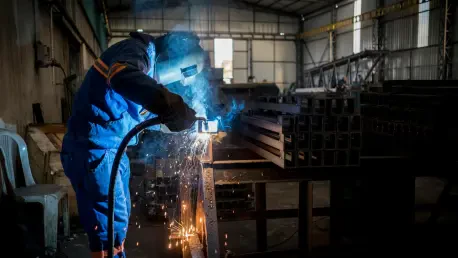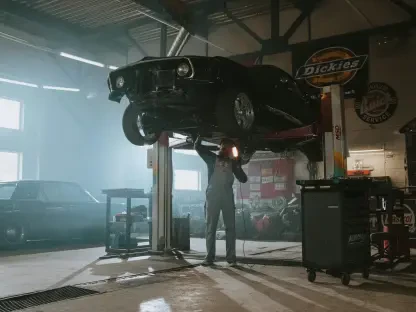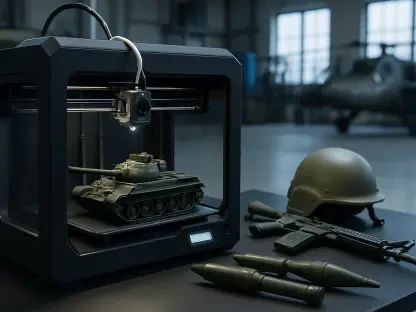In an era where global trade policies are reshaping industries at an unprecedented pace, tariffs have emerged as a double-edged sword, revealing both vulnerabilities and opportunities within the manufacturing sector, while driving up production costs and disrupting supply chains. These trade barriers, often imposed to protect domestic markets, are forcing companies to reconsider their reliance on overseas operations. More critically, they highlight a glaring gap in the workforce—specifically, the lack of skilled labor capable of leveraging advanced technologies to maintain competitiveness. As manufacturers grapple with the push to localize production, the reality becomes clear: cutting-edge tools alone cannot bridge the divide. The true challenge lies in equipping workers with the expertise needed to navigate modern processes, a need that has grown increasingly urgent under the weight of economic pressures. This pressing issue sets the stage for a deeper exploration of how trade policies underscore the necessity for a robust, skilled manufacturing base.
Trade Policies and Manufacturing Challenges
Economic Pressures Reshaping Production Strategies
Tariffs, as a tool of trade policy, have significantly altered the landscape for manufacturers by imposing additional costs on imported goods and raw materials, compelling many to rethink their global supply chains. This shift toward reshoring—bringing production back to domestic soil—appears as a logical response to avoid escalating expenses and mitigate risks tied to international disruptions. However, the transition is far from seamless. Companies face substantial hurdles, including the high initial investment required for setting up local facilities and the complexities of reconfiguring logistics. Beyond these logistical concerns, the most formidable barrier often lies in the human element. Without a workforce trained to handle sophisticated equipment and processes, reshoring efforts risk stalling, leaving manufacturers unable to capitalize on the potential cost savings or strategic advantages. This economic pressure reveals a fundamental truth: sustainable production demands more than just policy adjustments; it requires a foundation of capable talent ready to meet modern demands.
Supply Chain Vulnerabilities Under Scrutiny
The imposition of tariffs has also exposed critical weaknesses in global supply chains, pushing manufacturers to confront the fragility of their over-reliance on foreign production networks. Disruptions caused by trade barriers often lead to delays, increased costs, and unpredictable availability of essential components, which can cripple operations. While reshoring offers a potential solution, it brings its own set of challenges, particularly in replicating the specialized processes and quality standards previously achieved abroad. A significant obstacle is the transfer of knowledge—digital files and blueprints alone cannot ensure success without workers who understand the intricacies of materials and production techniques. This vulnerability underscores the need for a localized workforce equipped with both technical proficiency and practical experience. As supply chains face ongoing scrutiny, it becomes evident that addressing these gaps is not merely a reaction to policy changes but a strategic imperative for long-term resilience in an uncertain global market.
Workforce Development as a Strategic Imperative
Bridging the Skills Gap in Advanced Technologies
As manufacturers pivot to localize operations in response to trade policies, the persistent skills gap in handling advanced technologies like additive manufacturing (AM) stands out as a critical barrier to success. AM, often heralded for its ability to enable on-demand production and reduce supply chain complexity, requires a deep understanding of materials, design principles, and digital workflows—expertise that remains in short supply. Many companies invest heavily in state-of-the-art machinery only to find that their workforce lacks the training to operate it effectively or troubleshoot issues. This disconnect results in underutilized equipment and missed opportunities for innovation. For instance, producing high-precision components for industries like aerospace demands not just technical know-how but also the ability to adapt processes to specific requirements. Closing this gap necessitates targeted training programs that go beyond basic operation, focusing on specialized skills to ensure technology translates into tangible outcomes.
Investing in Human Capital for Long-Term Resilience
Addressing the skills shortage in manufacturing requires a deliberate and sustained investment in human capital, a move that proves essential for building resilience against trade disruptions. Companies must prioritize comprehensive training initiatives that encompass not only the operation of advanced tools but also critical areas like quality assurance and process optimization. This approach ensures that workers can handle the nuanced demands of modern production, such as designing for specific manufacturing methods or maintaining stringent standards in high-stakes sectors like automotive. Moreover, fostering a culture of continuous learning can help keep pace with rapidly evolving technologies, preventing skills from becoming obsolete. Partnerships with educational institutions and industry bodies can further amplify these efforts, creating pipelines of talent equipped for future challenges. By placing human capital at the core of their strategies, manufacturers can transform the pressures of tariffs into an opportunity to build a more robust and adaptable production base.
Cultivating Expertise for Competitive Advantage
Beyond immediate training needs, cultivating deep expertise within the workforce offers manufacturers a distinct competitive edge in a tariff-driven landscape. Skilled employees bring more than operational efficiency; they drive innovation by refining processes, solving complex problems, and ensuring consistent product quality—factors that are non-negotiable in industries where precision is paramount. For example, creating customized components like heat exchangers requires an intricate blend of technical knowledge and practical experience that cannot be easily replicated through automation alone. Developing this level of proficiency demands time, mentorship, and hands-on learning opportunities, which companies must commit to as part of their long-term vision. By fostering such expertise, manufacturers not only mitigate the risks posed by trade policies but also position themselves as leaders in a market increasingly defined by localized, high-quality production. This focus on talent ultimately turns a policy challenge into a strategic differentiator.









